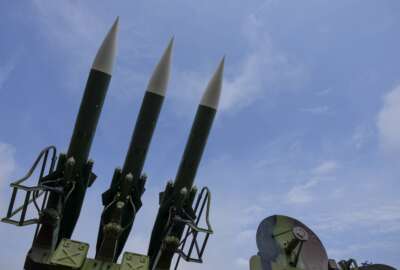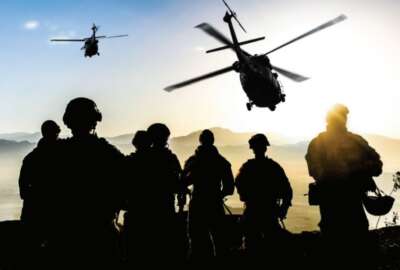Air Force communication squadron redesignated for cyber defense mission
Recently, the Air Force's 55th communication squadron was redesignated as the 55th Cyber squadron. What does that mean? Well, for one thing, it means the squadron...
Best listening experience is on Chrome, Firefox or Safari. Subscribe to Federal Drive’s daily audio interviews on Apple Podcasts or PodcastOne.
Recently, the Air Force’s 55th communication squadron was redesignated as the 55th Cyber squadron. What does that mean? Well, for one thing, it means the squadron now has responsibility for cyber defense operators on the Air Force’s tactical edge. For what that means. Federal News Network’s Eric White spoke to its commander, Lieutenant Colonel Christopher Wong.
Interview transcript:
Christopher Wong: The 55th communication squadron was the unit that provided the IT support for off the Air Force Base. Several years back, we started employing cyber weapon systems to the Air Force, one of which was the cyber vulnerability assessment Hunter weapon system. They sent that system over here for us to start looking at cyber defense and Mission Assurance. And so now the fifth wing actually has a cyber mission system and weapon system in the CVH. Where we have grown is we had a couple of major initiatives that were at the Air Force level. The first one was to allocate our IT support over to what we call enterprise IT as a service. Essentially, it was contracting out IT support for the base. Because we were one of the lead bases for this effort — there are seven risk reduction effort bases, and we’re one of the lead bases of that — we’re able to free up airmen to conduct a workforce transformation, and get our airmen to start training in cyber defense and employing that cyber weapon system.
Eric White: And so is that kind of what led up to this redesignation, a little bit of shift in mission and it looks like you all will be going a little bit more on offense than defense.
Christopher Wong: So first, it was a headquarters Air Force initiative to start assuring our mission systems across the Air Force. They designated multiple mission defense teams to get after that problem set where nation states like Russia or China might be attacking our mission systems itself, right. And so when we talk about the cyberspace squadron, they issued a program active action directive, which allows units to explore modernizing the force, employing this weapon system to combat the bad guys. And so for us here, because we were able to free up some of the bodies, we hope to mature sure our mission defense team to employ CVH and re designate as a cyber squadron once we met the initial operating capability requirements.
Eric White: And you were able to do that through the COVID pandemic. I imagine that that presented some of its challenges. Were there any sort of special circumstances that you had to take in order to accomplish that, while not being able to speak face-to-face with everyone you need to do?
Christopher Wong: Yeah, so coming into command, every commander dreams of having their ceremony, meeting the unit and rolling out in executing the mission. I did my ceremony in front of my family and a couple of key individuals and that was it. It was very challenging from a leadership perspective. I met my ops flight commander, two months after I took over the job, and then another flight director about six months in. So it was different. However, I think that with every crisis comes opportunity. And so because the unit was in a transition with teleworking, there was a lot of fluctuation in our alignment of personnel. We took advantage of that and use a churn. And what we did was we provided guidance to my leadership, which are phenomenal individuals. And we essentially threw all the pieces of the puzzle in the air. And as they guided back down and people started coming back from COVID, they land in a new unit. And so it was advantageous from that perspective. It wasn’t a day-to-day, you know, steady state mission that we’re executing, which we’re trying to make that change through. We were already in change. And that actually helped us out a little bit, I think. And then the airmen on the ground level, they were phenomenal and grew where they’re planted for for a couple of months. Some of them didn’t even know who their supervisor was, but it turned out well in the end, and now we’re rocking and rolling as a cybersec Squadron.
Eric White: We’re speaking with Lieutenant Colonel Christopher Wong, he’s the commander of the 55th communication squadron now known as the 55th Cyber squadron. Yeah, that’s pretty important to know for your bosses, especially in the military. I wanted to ask you, what do you see now as the main mission of the squadron, now that everything is kind of set, the dust is kind of settled? You know, day-to-day, what do you see as the most important objective?
Christopher Wong: Yeah. So one of the things that I changed immediately coming into command was our vision. And a part of that vision is to become a team of warfighting or combat-ready warfighting airmen. Our objective is to compete with Russia and China in competition today. That’s really our mission. Well, what does that mean, right? What that means is specifically for the cyber squadron is to be able to execute information warfare convergence. That means that we have the ability to fight in the information environment, and collaborate and team up with other partners in the space to win against the bad guys. That is our core objective. The unique approach that we’ve had in the 55th cyberspace squadron is that we execute a hybrid approach. By that I mean, there’s a lot of discussion about suffering IT support and then the cyber defensive warfighting side. But from my perspective, it’s one in the same fight. You’re both in the information environment, one just happens to have a different role, but it could be to an advantage. So one of one of the vignettes or hypothetical scenarios I kind of provide my airmen and people I talk to is, you know, you look at the movie 300, right? You have 300 Spartans fighting 10,000 Persians. And you would ask them how do they hold off for so long? Well, first of all, they were very capable warfighters. They were extremely good at what they did. But the other interesting part was they use the terrain to their advantage. They were in that crevice in the ideal location, which enhanced the abilities that they had to defend against all those Persians. Now, the scenario that I then throw in front people is, hey, what happens when you put those 300 Spartans in the middle of a cornfield in Nebraska, or Iowa, which is where we’re at? You would have to fight the fight slightly different. Well, how do you win? Oh, most people will say we could train better. Well, they are already pretty well trained. You could increase your capabilities by like, I throw a spear, it splits up into 10, I hit 10 people at once. You can recruit the locals and train them up, like gain more force. But those are all really resource intensive, right? So my perspective is what happens we transported those mountains in Greece, and then plop them in the middle of the cornfield in Nebraska temporarily. Well, that’s kind of a weird situation. Well, we live in the information environment, and it’s very dynamic and agile, right? So who would be the individual to do that? Well, it would be our IT support the people who engineer operate and maintain those networks, which is our battlespace, what we want to do is we want to pair up with them to put our defenders in the best possible advantage against the enemy and then work together. So that’s kind of how we’re very unique here in this squadron, in this unit, is that particular approach. Our IT support is very good at engineering solutions for, and capabilities for, our defenders to use. They also manipulate the terrain in a way that’s advantageous to our defenders. But then, on the other side, our defenders are awesome at looking at the threat and then countering them with the capabilities that they have. So that’s kind of where we’re at now. So with that we are able to execute the information warfare conversions.
Tom Temin: Lieutenant Colonel Christopher Wong is Commander of the Air Force’s 55th Cyber squadron speaking with Federal News Network’s Eric White.
Copyright © 2025 Federal News Network. All rights reserved. This website is not intended for users located within the European Economic Area.
Tom Temin is host of the Federal Drive and has been providing insight on federal technology and management issues for more than 30 years.
Follow @tteminWFED






